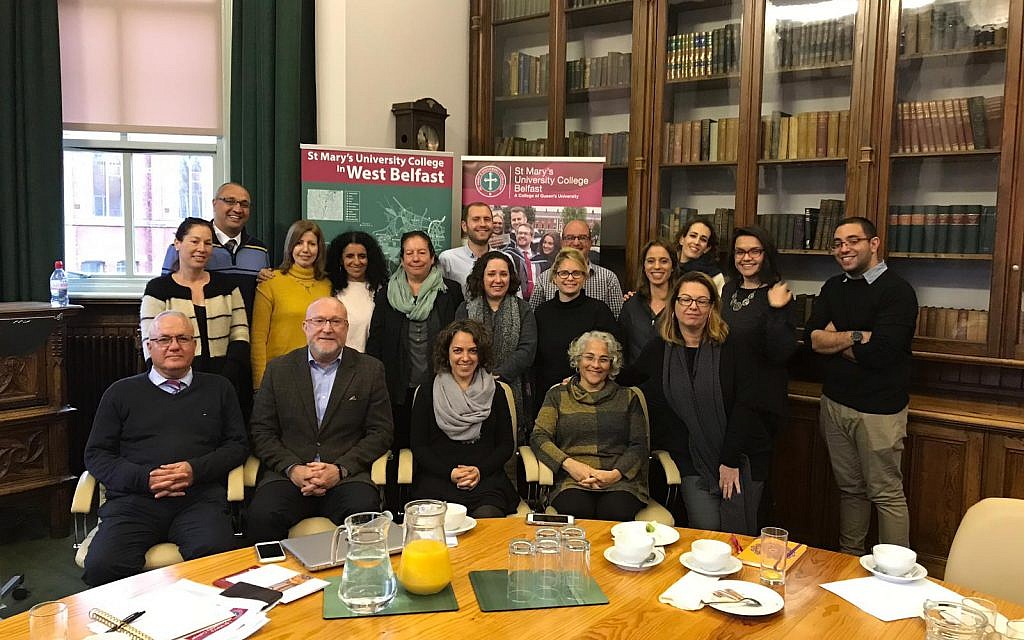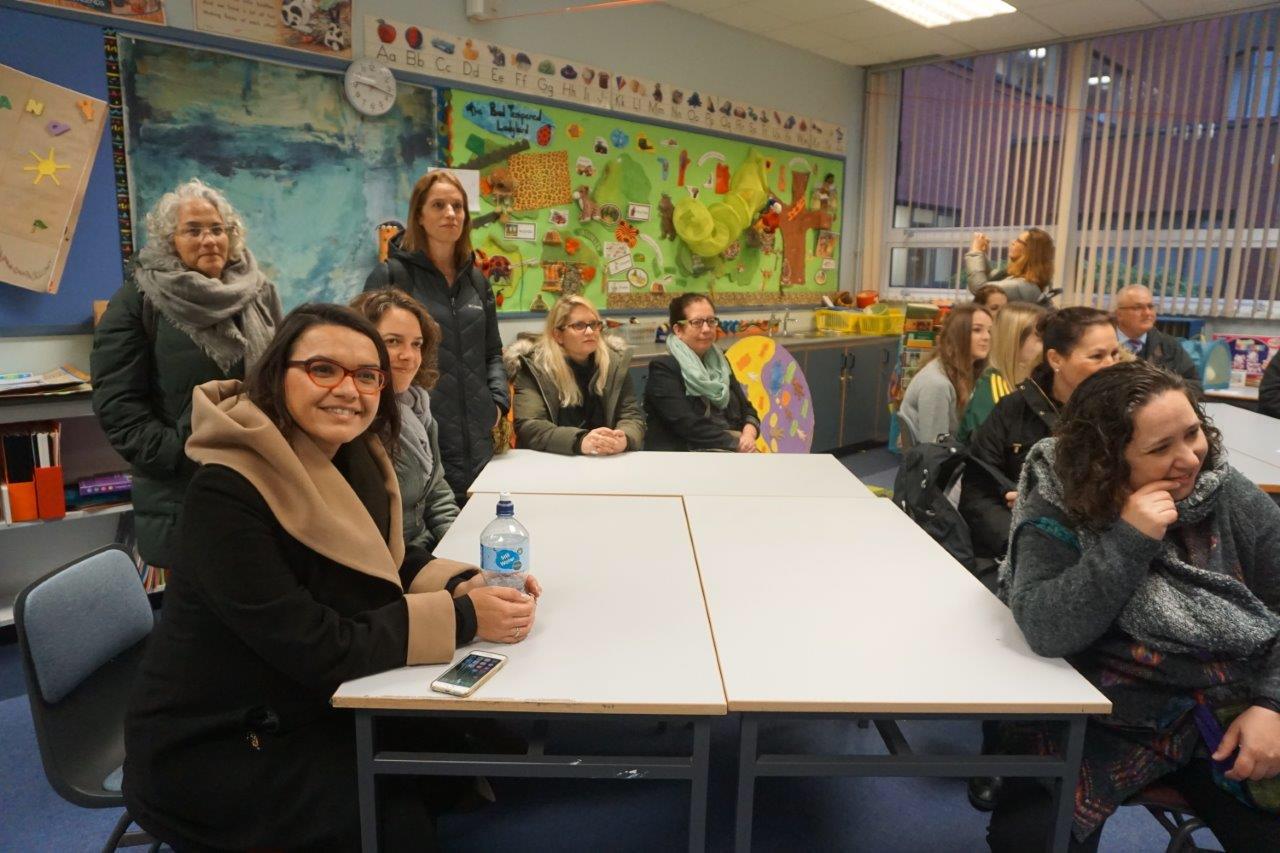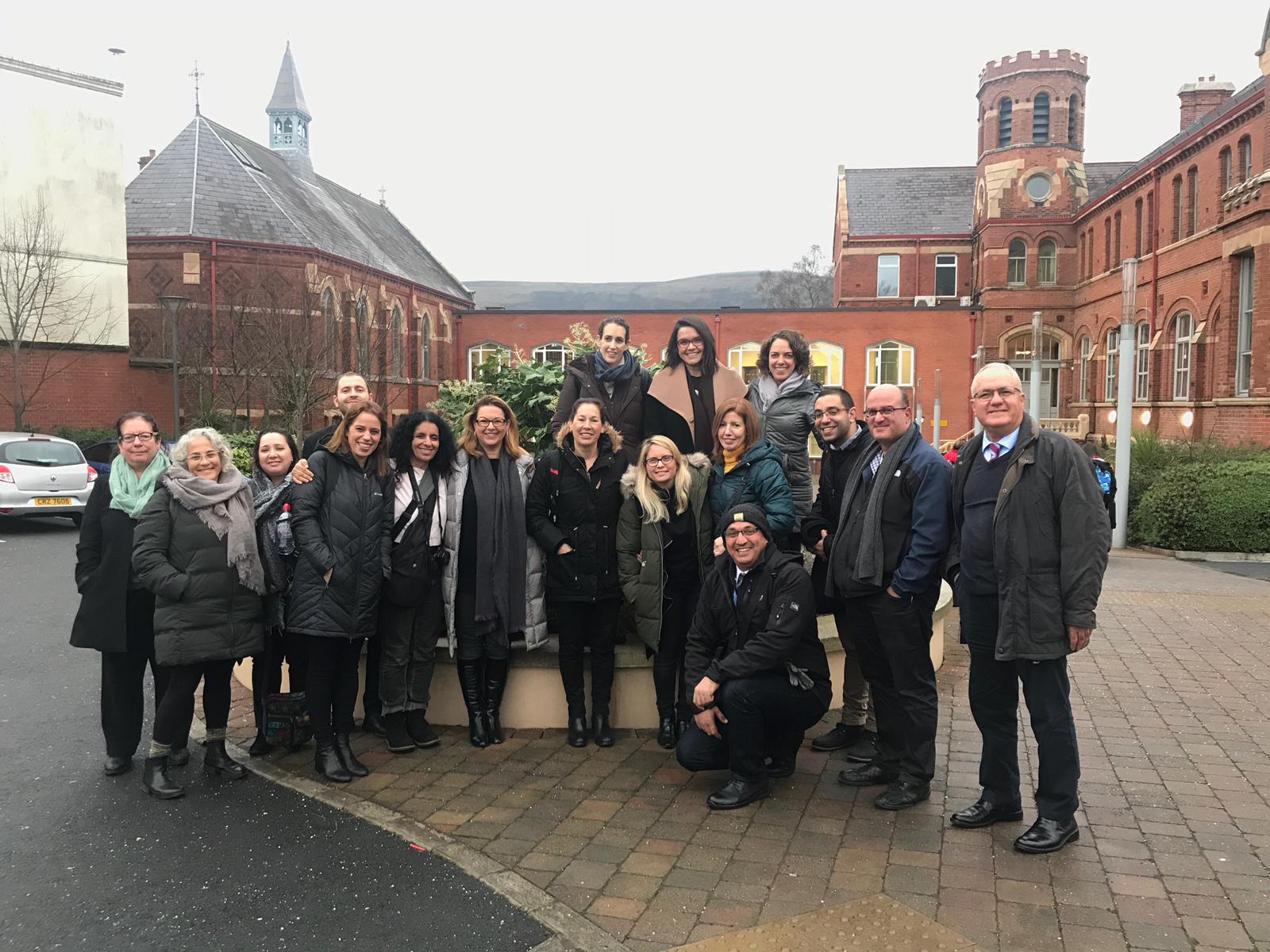Israeli educators in Belfast to hear how cohesion comes from conflict
Four day trip helps colleges and universities promote better co-operation between religious and ethnic sections of society
An Israeli delegation of higher education professionals has just returned from a first-of-its-kind tour of Northern Ireland to “learn lessons” about how colleges and universities can bring divided communities together.
The innovative four-day residential was designed to help the Israeli higher education sector promote partnership between secular, modern Orthodox and strictly Orthodox Jews, and Israeli Arabs, all of whom study in separate school systems.
Israeli President Reuven Rivlin repeatedly refers to these culturally-distinct groups as Israel’s “four tribes” and recognises that higher education is the first time many will have come across Israelis from the other “tribes”.
Get The Jewish News Daily Edition by email and never miss our top stories Free Sign Up
In 2016 he said: “Whereas in the past the IDF was the main meeting place for Israelis, with the new Israeli agenda, whether we like it or not, academia has become the first place where Israeli society confronts itself. Academia and the labour market are the gateways to the fulfilment of the Israeli dream.”
The 17-strong delegation visiting Belfast last week was part of Israeli Hope in Academia, one of Rivlin’s signature initiatives, and participants represented all four society groups and institutions such as the University of Haifa, Tel Aviv University and Tel Hai College in the Upper Galil, which has received support from UJIA.
“Northern Ireland is similar to Israel in that it is a society dealing with a heritage of conflict, threat and distrust,” said Ayala Hendin, director of Israeli Hope in Academia (IHA). “Both school systems are divided by religion/ethnicity and both higher education systems serve as a first meeting point for all populations.”
The Israeli delegation visited Queen’s University, Ulster University, St. Mary’s and Stranmillis teachers’ colleges and discussed the work being done to promote diversity and inclusion, hosted by Professor Tony Gallagher, Dean of Research at Queen’s University.
As part of the peace process, he recognised – as Rivlin has – that schools, colleges and universities can drive cultural change in their role as a first meeting point, in Northern Ireland’s case between Catholic and Protestant communities.
“There was a debate about whether to encourage denominational schools and colleges, to promote identity, or to encourage common schools, to promote cohesion,” said Gallagher, speaking to Jewish News.
“It’s a challenge many societies divided by strong identities face. We realised that you could have the best of both worlds, by keeping denominational schools but facilitating their collaboration and partnership with schools of different identities.”
The project was called Shared Education and started in 2007 with 12 schools. Today more than 700 schools have signed up, such that Gallagher now describes the idea of cross-communal educational partnerships as “ubiquitous”. So successful was it that lawmakers enshrined the project in legislation in 2016.
The idea impressed the Israeli visitors, said Hendin. “Prof Gallagher truly inspired us. The idea that it started as a research project and now includes 70 percent of the schools in Northern Ireland is mind blowing.”
Gallagher said Israel had similar challenges and opportunities and explained that the four-day residential allowed “different perspectives, ranging from a Catholic college hugely committed to the idea of denominational schools, to a college keen to drive inclusion and diversity, taking part in the annual Pride parade”.
Among the delegates was Daphna Biran Singer, chief executive of The Rothschild Partnerships, which supports Rivlin’s initiative.
She said there were some key learning points, including how “the need to talk about the conflict has a value… It is done in different arenas even if 20 years has gone by and it [the conflict] continues”.
Biran Singer also said she learned how “language is a central tool for bridging and creating common ground, but also making distinction through use of words by different groups in society,” and that “the ability to get out of the dichotomy point of view and see a wide variety of options is must”.
She added that The Rothschild Partnerships was “also working on these issues, and there is a glimmer of hope, but there is still a long way to go. I came back optimistic”.
Hendin agreed. “Now we are back in Israel, we are very much looking forward to continuing our work to promote partnership within Israeli society with a focus on the four groups separated in our educational system,” she said.
“We are excited to think of the role of higher education – and particularly teacher training programmes – in promoting partnership. We look forward to writing the next chapter of the Israeli story.”

Thank you for helping to make Jewish News the leading source of news and opinion for the UK Jewish community. Today we're asking for your invaluable help to continue putting our community first in everything we do.
For as little as £5 a month you can help sustain the vital work we do in celebrating and standing up for Jewish life in Britain.
Jewish News holds our community together and keeps us connected. Like a synagogue, it’s where people turn to feel part of something bigger. It also proudly shows the rest of Britain the vibrancy and rich culture of modern Jewish life.
You can make a quick and easy one-off or monthly contribution of £5, £10, £20 or any other sum you’re comfortable with.
100% of your donation will help us continue celebrating our community, in all its dynamic diversity...
Engaging
Being a community platform means so much more than producing a newspaper and website. One of our proudest roles is media partnering with our invaluable charities to amplify the outstanding work they do to help us all.
Celebrating
There’s no shortage of oys in the world but Jewish News takes every opportunity to celebrate the joys too, through projects like Night of Heroes, 40 Under 40 and other compelling countdowns that make the community kvell with pride.
Pioneering
In the first collaboration between media outlets from different faiths, Jewish News worked with British Muslim TV and Church Times to produce a list of young activists leading the way on interfaith understanding.
Campaigning
Royal Mail issued a stamp honouring Holocaust hero Sir Nicholas Winton after a Jewish News campaign attracted more than 100,000 backers. Jewish Newsalso produces special editions of the paper highlighting pressing issues including mental health and Holocaust remembrance.
Easy access
In an age when news is readily accessible, Jewish News provides high-quality content free online and offline, removing any financial barriers to connecting people.
Voice of our community to wider society
The Jewish News team regularly appears on TV, radio and on the pages of the national press to comment on stories about the Jewish community. Easy access to the paper on the streets of London also means Jewish News provides an invaluable window into the community for the country at large.
We hope you agree all this is worth preserving.
- News
- Ireland News
- Ireland
- Northern Ireland
- Northern Ireland News
- Protestant
- catholic
- secular
- israeli arabs
- modern orthodox
- strictly Orthodox
- Israeli Hope in Academia
- Israeli President Reuven Rivlin
- University of Haifa
- Tel Aviv University
- Tel Hai College
- professor tony gallagher
- Good Friday Agreement
- shared education
- denominational schools
- rothschild partnerships
- Israel News
-
By Brigit Grant
-
By Laurent Vaughan - Senior Associate (Bishop & Sewell Solicitors)
-
By Laurent Vaughan - Senior Associate (Bishop & Sewell Solicitors)
-
By Laurent Vaughan - Senior Associate (Bishop & Sewell Solicitors)
-
By Laurent Vaughan - Senior Associate (Bishop & Sewell Solicitors)
























